The Crucial BX200 (480GB & 960GB) SSD Review: Crucial's First TLC NAND SSD
by Billy Tallis on November 3, 2015 9:00 AM ESTSequential Read Performance
Just like the random read test, sequential reads are tested across the span of a full drive and a representative sample of queue depths. This test performs 128kB reads. Most operations involving large files (typically images and videos) fall under this test's purveiw, but streaming or playing even the highest resolution videos doesn't require anywhere near the full bandwidth of a SSD. Copying files to another SSD or loading very large files into an editing program will more likely use all the speed that's available.
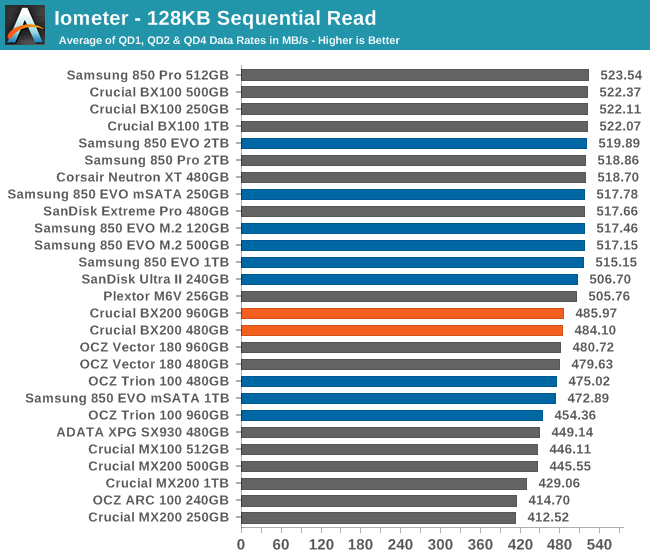
At last we see respectable performance from the BX200. Its sequential read speeds aren'te quite up to the SATA limit at low queue depths, but it can sustain solid performance. Unfortunately, for anyone holding out hope that the poor results we've seen so far may be a testbed issue, the otherwise respectable sequential performance puts that idea to rest.
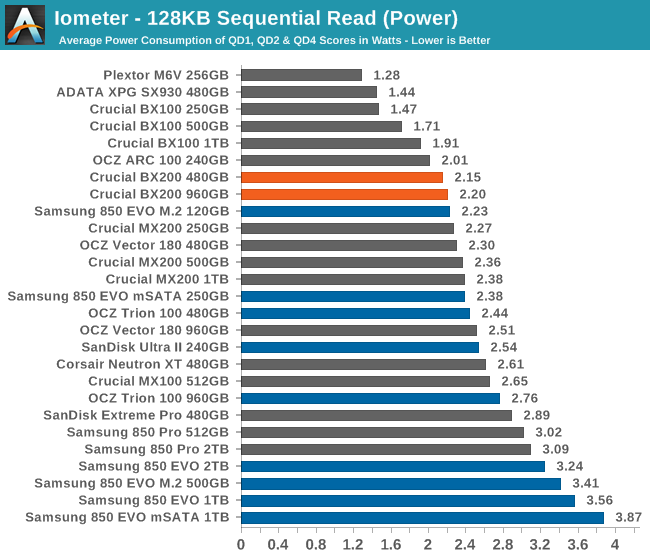
Power consumption on sequential reads is actually good, though it won't catch up with the best of drives.
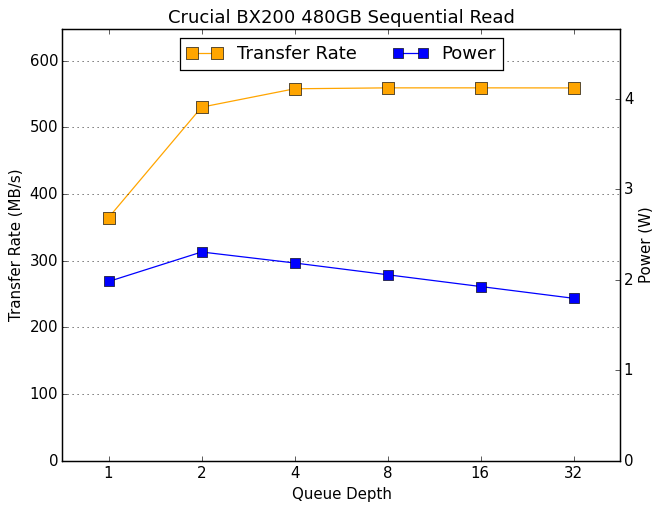 |
|||||||||
| Default | |||||||||
Given a larger queue depth, the BX200 is actually able to reach the performance plateau of the SATA speed limit; it just takes a little longer than the top tier of drives. Given the performance, it's not surprising to see that power consumption doesn't grow much. The shallow but steady decline in power consumption for the 480GB drive may be a sign that it's able to do some prefetching and caching to reduce the number of times it has to read from the flash.
Sequential Write Performance
The sequential write isn't limited to a small span of the disk, as that usually doesn't make a difference for this performance metric. As always, our averages are of the lower queue depths, but scaling to higher queue depths is also investigated. Bulk file copies and recording uncompressed video are the kind of uses that depend on sequential write performance.
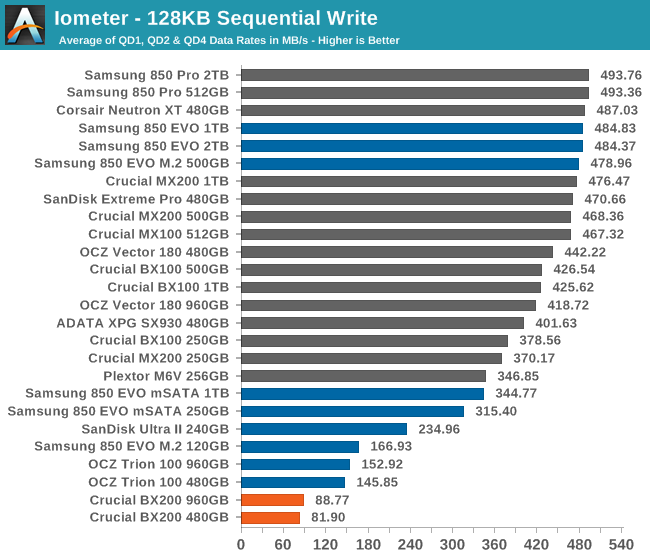
The initial good news we saw with the BX200's sequential read performance didn't last long. The drive's write performance is bad for sequential access just like random access, unfortunately displacing the Trion 100 as one of the worst drives in our current collection.
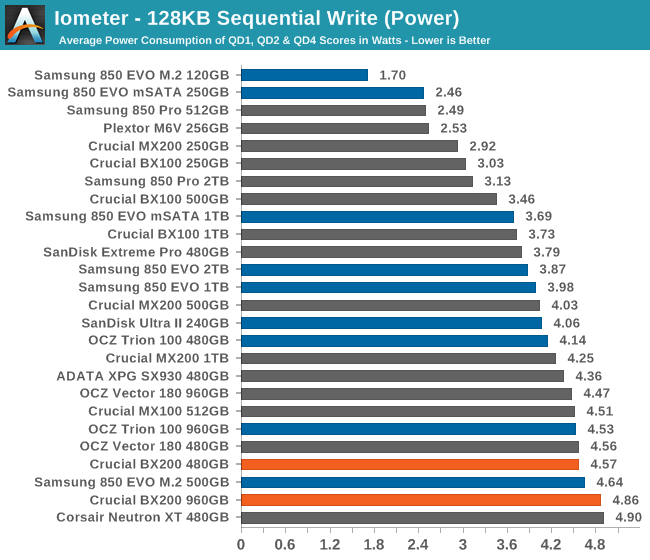
The BX200 power consumption during sequential writing is poor but not radically so. It would seem that Micron's TLC flash requires at most a little more power to write to than other TLC, and this drive is just wasting most of that power budget on background management.
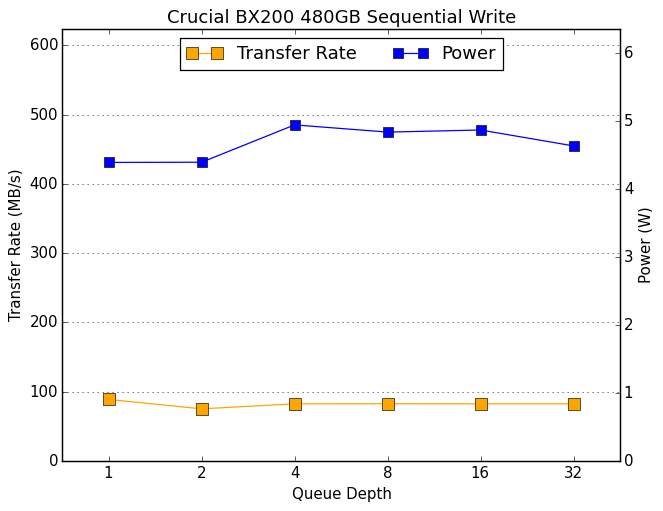 |
|||||||||
| Default | |||||||||
Looking at larger queue depths, performance drops slightly after QD1, and stays low as power consumption shifts around some but is always high. Neither capacity of the BX100 can sustain even 100MB/s of writes for a length of time.










85 Comments
View All Comments
paulgj - Monday, November 9, 2015 - link
I just ordered a couple more BX100's 250GBdoggface - Tuesday, November 3, 2015 - link
The MX100 was just brilliant, an easy recommendation.The BX100 has been my go to value SSD, that l I recommended to many friends. The bx200 is garbage which costs more? And is about as bad as a HDD. What the hell crucial. What the hell.Luke212 - Tuesday, November 3, 2015 - link
BX100 and MX100 were great.... how can they go backward so badly?JDG1980 - Tuesday, November 3, 2015 - link
It's looking more and more as though TLC is a big flop. It doesn't seem to provide substantial price savings, and it comes at a considerable cost in performance, durability, and reliability.For a TLC drive to be worth it, it would need to be 1/2 to 1/4 the cost per gigabyte of a MLC solution on the largest drives. It then might be acceptable for people who want moderately priced bulk storage that's cheaper than standard SSDs. But that's not close to being the case now, and it may never be.
CiccioB - Wednesday, November 4, 2015 - link
Yeah, I still wonder if TLC is really reliable as producers advertise them.Samsung needed a "hack" to their 840 TLC series to solve data retention problems reducing life time.
We do not know if others have done the same without (obviously) telling publicly. And if 850 series has it under the hood.
I would go to MLC drives for few $ more. I feel them as more reliable and durable. And "feeling" is an important thing for me, as I put my data on them and saving few bucks may not really be an advantage when a TLC drive lives less then a MLC one.
For performance, I bet anyone to be able to discern differences in real life form an SSD to another. This are "synthetic" tests, where source of data is faster than SSD speed (RAM). For whatever real usage, anything comes from sources that are slower (HDD, network, optical disks). Load times into RAM is limited, as you don't usually load GB and GB into it but during a benchmark.
What it really matters is reliability, durability and price. TLC fails to make me comfortable with the first two criteria. Which, for me, are the most important ones.
CiccioB - Wednesday, November 4, 2015 - link
"This are "synthetic" tests"These are synthetic tests.
Edit button, please!
extide - Thursday, November 5, 2015 - link
Yeah it seems like you really need to go to 3D NAND to get decent TLC -- the 850 EVO's have so far been pretty much great. That significantly larger feature size really helps the TLC out.Beaver M. - Wednesday, November 4, 2015 - link
No wonder I have been skipping reviews of new SATA SSDs for a few years now. Nothing can touch the Samsung ones, and thats sad.ghanz - Wednesday, November 4, 2015 - link
Review request: Please do a review of Sandisk Plus, their current lowest tier SSDs available in 120gb and 240gb capacities.Will be interesting to see how those compares to the BX100 and BX200 in similar capacities.
Mugur - Wednesday, November 4, 2015 - link
I must buy another BX100 until the stocks will dry...